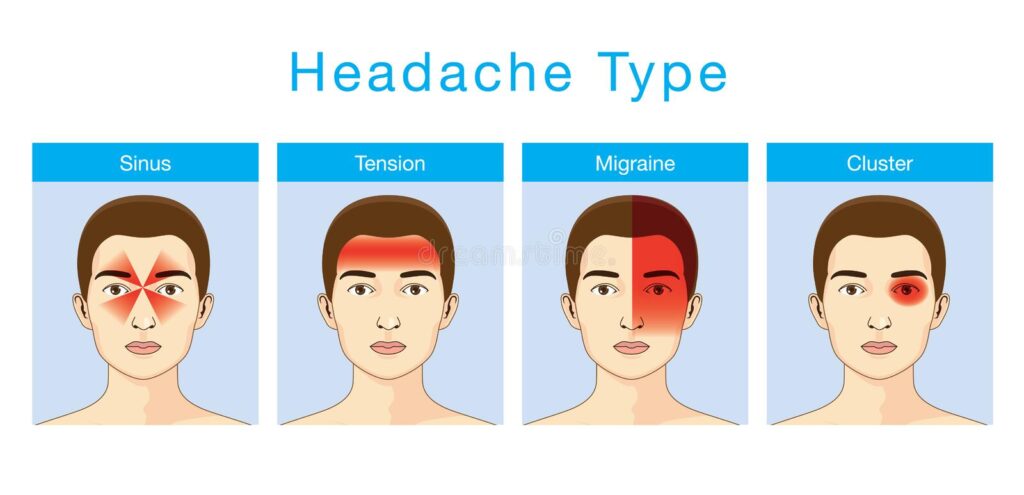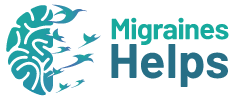This article contains self-care information for the selected condition. If you have questions or need more comprehensive treatment advice, please consult a medical professional
Type of headache

- Tension Headaches:
Tension headaches are the most common type of headache. They are often described as a dull, squeezing pain that feels like a tight band around the head. The cause of tension headaches is usually related to stress or tension in the neck and shoulders. Symptoms include mild to moderate pain, pressure around the forehead, and aching in the neck and shoulders. Treatment options include over-the-counter pain relievers, relaxation techniques, and stress management.
- Migraines:
Migraines are a type of headache that typically involves severe throbbing pain on one side of the head, sensitivity to light and sound, and sometimes nausea and vomiting. Migraines are often triggered by stress, certain foods, hormonal changes, and other factors. Treatment options include prescription medications, lifestyle changes, such as avoiding triggers and stress management, and alternative therapies such as acupuncture and biofeedback.
- Cluster Headaches:
Cluster headaches are a rare but extremely painful type of headache that typically occur on one side of the head and are accompanied by tearing and redness in the eye. They are called cluster headaches because they tend to occur in cycles, with periods of intense pain followed by periods of remission. The cause of cluster headaches is not fully understood, but they are thought to be related to abnormalities in the hypothalamus. Treatment options include prescription medications, oxygen therapy, and nerve stimulation.
- Sinus Headaches:
Sinus headaches are caused by inflammation or infection in the sinus cavities. Symptoms include pain and pressure in the forehead, cheekbones, and nose, as well as nasal congestion and discharge. Treatment options include over-the-counter pain relievers, decongestants, and prescription antibiotics for bacterial infections.
Other types of headaches include rebound headaches, thunderclap headaches, and hormonal headaches. If you are experiencing frequent or severe headaches, it is important to talk to your doctor to determine the underlying cause and develop an appropriate treatment plan.
causes of headache
- Tension and Stress:
One of the most common causes of headaches is tension and stress. Stress can cause tension in the muscles of the neck and scalp, leading to tension headaches.
- Dehydration:
Dehydration can cause headaches, as the brain needs a sufficient amount of water to function properly. Lack of water can cause the brain to shrink slightly, leading to headaches.
- Eye Strain:
Eye strain can cause headaches, especially in people who spend a lot of time looking at computer screens or other digital devices. This is because the eyes have to work harder to focus on the screen, leading to strain and headaches.
- Certain Foods and Beverages:
Certain foods and beverages can trigger headaches in some people. These include alcohol, caffeine, chocolate, aged cheeses, and foods containing MSG.
- Hormonal Changes:
Hormonal changes can also cause headaches, especially in women. Menstrual cycles, pregnancy, and menopause can all lead to hormonal changes that can trigger headaches.
- Environmental Factors:
Environmental factors, such as weather changes, pollution, and strong odors, can also trigger headaches in some people.
- Medical Conditions:
Headaches can also be a symptom of an underlying medical condition, such as high blood pressure, sinus infections, or migraines
symptomes of headache
The symptoms of a headache can vary depending on the type of headache and the underlying cause. However, some common symptoms of headaches include:
- Pain or discomfort in the head, scalp, or neck
- Pressure or tightness around the forehead or temples
- Throbbing or pulsing pain on one or both sides of the head
- Sensitivity to light, sound, or odors
- Nausea or vomiting
- Dizziness or lightheadedness
- Blurred vision or temporary vision loss
- Fatigue or weakness
- Difficulty concentrating or thinking clearly
The symptoms of headaches can range from mild to severe and can last for a few minutes to several days. Some types of headaches, such as migraines, can be accompanied by additional symptoms, such as aura (flashing or shimmering lights in the field of vision) or visual disturbances.
headache treatement
- Over-the-counter pain relievers:
Over-the-counter pain relievers such as acetaminophen, aspirin, ibuprofen, and naproxen can be effective in treating mild to moderate headaches.
- Prescription medications:
For more severe headaches, prescription medications such as triptans, ergots, and opioids may be prescribed by a doctor. These medications can help relieve pain and reduce the frequency and severity of headaches, but they can also have side effects and should only be used as directed by a doctor.
- Lifestyle changes:
Making lifestyle changes such as getting regular exercise, reducing stress, improving sleep habits, and avoiding triggers such as certain foods and beverages can also help reduce the frequency and severity of headaches.
- Alternative therapies:
Alternative therapies such as acupuncture, massage, biofeedback, and relaxation techniques can also be effective in managing headaches.
- Prescription preventive medications:
If you experience frequent or severe headaches, your doctor may prescribe preventive medications such as beta-blockers, antidepressants, or anti-seizure medications to help reduce the frequency and severity of headaches.
- Injections:
In some cases, injections of medication such as Botox can be used to prevent migraines.
It’s important to work with your doctor to determine the underlying cause of your headaches and develop an appropriate treatment plan. With the right treatment, most headaches can be effectively managed or even prevented altogether.
Tension Headaches
Tension headaches are the most common type of headache, accounting for approximately 90% of all headaches. These headaches are often described as a dull, aching pain that feels like a band tightening around the head. They can last for a few hours to a few days and can be accompanied by other symptoms such as sensitivity to light and noise, as well as mild nausea.
The exact cause of tension headaches is not well understood, but they are believed to be caused by muscle tension in the head and neck, as well as changes in levels of certain neurotransmitters in the brain.
Treatment for tension headaches typically involves over-the-counter pain relievers such as acetaminophen, aspirin, ibuprofen, and naproxen. Other treatments may include relaxation techniques, such as deep breathing or meditation, and physical therapy to help alleviate muscle tension in the neck and head.
Preventing tension headaches may involve making lifestyle changes such as reducing stress, improving posture, and getting regular exercise. It’s also important to avoid triggers such as alcohol, caffeine, and certain foods that can increase the risk of tension headaches.
If you experience frequent or severe tension headaches, it’s important to talk to your doctor to determine the underlying cause and develop an appropriate treatment plan.
Types of headaches based on location
In some cases, it may be possible to identify a particular type of headache based on which part of the head is affected.
The following is a breakdown of headache types based on location. It should be noted that some types of headache can affect multiple locations. Moreover, some types of headache, such as post-traumatic headaches or tumor headaches are generalized, meaning they affect the whole of the head.
- Frontal (front of the head): tension headache, migraine, sinus headache, caffeine-triggered headache, hangover headache, hypertension headache
- Temporal (side of the head): tension headache, hangover headache
- Occipital (back of the head): tension headache, hypertension headache
- Middle or top of the head: tension headache
- One side of the head: migraine, cluster headache
- Behind or around the eyes: cluster headache, caffeine-triggered headache
Diagnosing headaches
Diagnosing headaches typically involves a thorough medical history and physical examination, as well as additional tests if necessary. During the medical history, your doctor will ask about your symptoms, including the type, frequency, and duration of your headaches, as well as any other associated symptoms.
Your doctor may also perform a physical examination to check for signs of other medical conditions that may be causing your headaches, such as sinus infections or dental problems.
If necessary, your doctor may order additional tests to help diagnose the underlying cause of your headaches. These tests may include:
- Imaging tests:
Imaging tests such as a CT scan or MRI can help identify abnormalities in the brain or other structures in the head that may be causing your headaches.
- Blood tests:
Blood tests can help identify underlying medical conditions, such as infections or autoimmune disorders, that may be causing your headaches.
- Neurological tests:
Neurological tests can help assess your brain and nervous system function and identify any abnormalities that may be causing your headaches.
- Allergy testing:
Allergy testing can help identify any allergies that may be triggering your headaches.
Diagnosing headaches can be complex, and it’s important to work with your doctor to determine the underlying cause and develop an appropriate treatment plan. If you experience frequent or severe headaches, it’s important to seek medical attention to rule out any serious underlying medical conditions.
Preventing headaches
Preventing headaches often involves making lifestyle changes and avoiding triggers that can increase the risk of headaches. Here are some tips for preventing headaches:
- Maintain a regular sleep schedule:
Getting adequate sleep on a regular schedule can help prevent headaches. Aim for at least 7-8 hours of sleep each night and try to go to bed and wake up at the same time every day.
- Manage stress:
Stress is a common trigger for headaches. Engage in stress-reducing activities such as meditation, deep breathing, or yoga to help prevent headaches.
- Stay hydrated:
Dehydration can also be a trigger for headaches. Drink plenty of water throughout the day to stay hydrated.
- Avoid trigger foods and drinks:
Certain foods and drinks can trigger headaches in some people. Common triggers include alcohol, caffeine, processed foods, and foods containing nitrates or MSG. Keeping a headache diary can help you identify your triggers.
- Exercise regularly:
Regular exercise can help reduce stress and tension, which can help prevent headaches. Aim for at least 30 minutes of moderate exercise most days of the week.
- Maintain good posture:
Poor posture can cause tension headaches. Make sure to sit up straight and avoid slouching.
- Take breaks from screen time:
Staring at a computer screen or smartphone for extended periods can cause eye strain and trigger headaches. Take regular breaks to rest your eyes.
When to see a doctor
Here are some general guidelines for when to see a doctor:
- If you have a fever: A fever can be a sign of an infection or illness, so it’s important to see a doctor if your temperature is above 100.4°F (38°C).
- If you have persistent pain: If you have pain that lasts for more than a few days or is severe, you should see a doctor. This could be a sign of a serious medical condition.
- If you have a persistent cough: If you have a cough that lasts for more than a few weeks, you should see a doctor. This could be a sign of an underlying condition, such as asthma or lung cancer.
- If you have a new or unusual symptom: If you experience a new or unusual symptom, such as sudden weight loss or unexplained fatigue, you should see a doctor. This could be a sign of a serious medical condition.
- If you have a chronic condition: If you have a chronic condition, such as diabetes or high blood pressure, it’s important to see a doctor regularly to manage your condition and prevent complications.
- If you have an injury: If you have an injury, such as a broken bone or a deep cut, you should see a doctor as soon as possible. Delaying treatment could lead to complications.
- If you have concerns about your mental health: If you have concerns about your mental health, such as depression or anxiety, you should see a doctor. There are effective treatments available that can help you manage these conditions.
It’s always better to err on the side of caution and see a doctor if you’re unsure whether your symptoms require medical attention.




